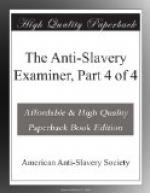I vote, and the marshal whom my agent appoints, returns a slave to South Carolina. Do I authorize it? Yes. I knew it would be his sworn duty, when I voted; and I assented to it, by voting under the Constitution which makes it his duty. If I trade, it is said, I may foresee that government will be helped by the taxes I pay, therefore I ought not to trade. But I do not trade for the purpose of paying taxes! And if I am to be charged with all the foreseen results of my actions, then Garrison is responsible for the Boston mob!
The reason why I am responsible for the pro-slavery act of a United States officer, for whom I have voted, is this: I must be supposed to have intended that which my agent is bound by his contract with me (that is, his oath of office) to do.
Allow me to request our opposers to keep distinctly in view the precise point in debate. This is not whether Massachusetts can rightfully trade and make treaties with South Carolina, although she knows that such a course will result in strengthening a wrongdoer. Such are most of the cases which they consider parallel to ours, and for permitting which they charge us with inconsistency. But the question really is, whether Massachusetts can join hands and strength with South Carolina, for the express and avowed purpose of sustaining Slavery. This she does in the Constitution. For he who swears to support an instrument of twelve clauses, swears to support one as well as another,—and though one only be immoral,—still he swears to do an immoral act. Now, my conviction is, “which fire will not burn out of me,” that to return fugitive slaves is sin—to promise so to do, and not do it, is, if possible, baser still; and that any conjunction of circumstances which makes either necessary, is of the Devil, and not of God.
OBJECTION XIV.
Duty requires of a non-voter to quit the country, and go where his taxes will not help to build up slavery.
ANSWER. God gave me my birth here. Because bad men about me “play such tricks before high Heaven, as make the angels weep,” does it oblige me to quit? I have as good right here as they. If they choose to leave, let them—I Shall remain. ’Twould be a pretty thing, indeed, if, as often as I found myself next door to a bad man, who would bring up his children to steal my apples and break my windows, I were obliged to take the temptation away by cutting down all my apple trees and moving my house further west, into the wilderness. This would be, in good John Wesley’s phrase, “giving up all the good times to the devil,” with a witness.
OBJECTION XV.
“Society has the right to prescribe the terms, upon the expressed or implied agreement to comply with which a person may reside within its limits.”




